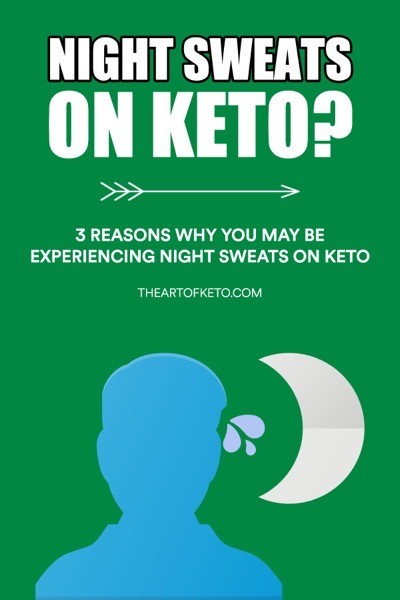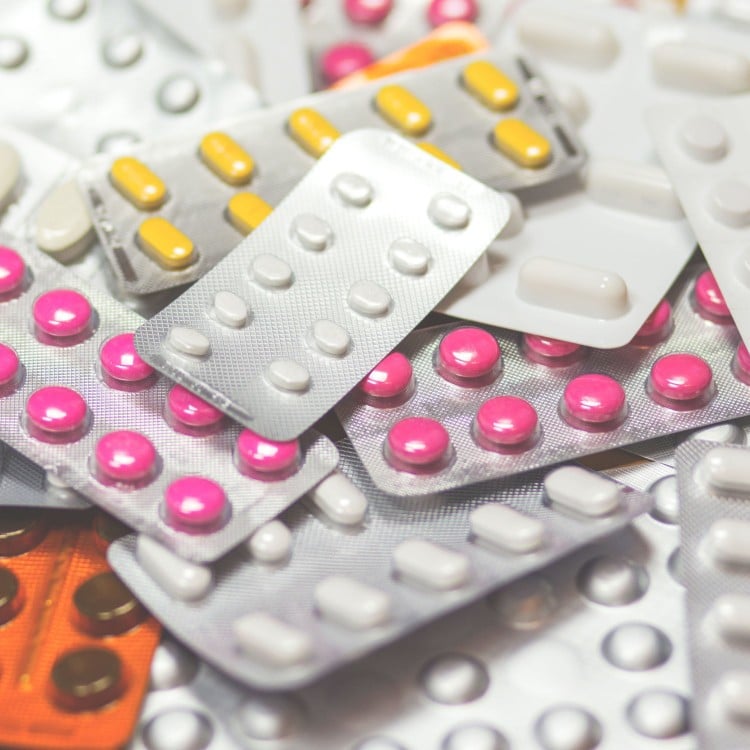The Best Fluffy Pancakes recipe you will fall in love with. Full of tips and tricks to help you make the best pancakes.
3 Reasons Why You May Be Experiencing Night Sweats On Keto
If you've dealt with night sweats, it can be quite an annoyance, especially since you're trying to sleep. Sometimes it got so bad for me that I would lay down a towel or switch to the other side of the bed after waking to avoid sleeping in a sweaty mess. I often wondered if keto had anything to do with it, but the answers weren't so clear.
Many things can cause night sweats, but the reasons a keto diet may lead to sweating at night include nocturnal hypoglycemia (a fall in blood glucose during sleeping hours), dehydration, sugar withdrawal, and certain medications.
In this article, I'll go over the different causes of night sweats, how a ketogenic diet may play a role, various symptoms you may experience as a result of keto, and ways to help alleviate your night sweat problems.

Get Keto Cheat Sheet Magnets: Check it out now here
Table of Contents
Keto And Night Sweats
I don't know if there is any worse feeling in the middle of the night than waking up soaked from head to toe.
From my experience, I would relate the amount of sweat to what I would experience had I been sitting in a sauna.
While I usually sweat from my forehead and upper body, I don't typically sweat on my legs, calves, or arms unless exposed to high amounts of heat, or of course, while suffering from night sweats.
Assuming your bedroom isn't unusually hot or you're not wearing layers of clothes to bed, what gives?
Night sweats can almost be seen as severe hot flashes that occur during the evening.
How a ketogenic diet may play a part isn't fully understood, but the main reasons may be:
- Low blood sugar
- Dehydration
- Sugar withdrawal
What Causes Night Sweats On Keto
Since we know three reasons why a ketogenic diet may lead to night sweats, let's dive into each one a little further, so you have a better understanding.
Low blood sugar
When following a ketogenic diet, especially in the beginning, blood glucose can fall low enough that It causes your body to warm up while you slumber.
When blood glucose falls below 70 mg/dl during sleep, this is referred to as nocturnal hypoglycemia.
While nocturnal hypoglycemia is most common in people who have type 1 diabetes 1 2, there may be a reason it happens when first starting a ketogenic diet.
During the first few weeks, when your body is shifting from burning glucose (sugar) to fat (ketones), your body is still inefficient at utilizing ketones to their full potential, especially your brain.
It is during this transitional phase that your body it lacking both fuel sources, less glucose because you're restricting it from the diet, and lack of ketones from being unable to use them efficiently.
Once you've become fat-adapted “keto-adapted,” which takes three weeks on average, you should begin to notice hot flashes on keto lessening or ultimately going away.
Supplementing with exogenous ketone supplements during the first couple of weeks on a ketogenic diet may help alleviate some symptoms while providing a boost in energy.
Exogenous ketone supplements I recommend
Dehydration
Many people who first start a ketogenic diet end up with certain signs and symptoms, commonly referred to as the “keto flu.”
The keto flu is usually a result of not only dehydration but a lack of electrolytes.
After starting a ketogenic diet, you may have experienced a sudden drop in weight.
Sorry to be the bearer of bad news, but a lot of the weight with the first couple of weeks of starting a ketogenic diet was water weight.
Yes, some of the weight was fat, but the majority of the weight lost, especially during the first week, was water.
On average, your body stores around 500 grams of carbohydrates in the form of glycogen, which is located in your muscle and liver cells. In addition to the 500 grams of carbs, each gram will store with it 3 grams of water.
When you begin to restrict carbohydrates from the diet, your body is forced to use this stored glycogen, and the additional water is expelled as a result.
The resulting water loss may be why you're sweating more when starting keto or noticed an increased frequency of urination.
To add salt to injury, vital electrolytes, especially salt and potassium, are flushed from the body. These electrolytes, in particular, are responsible for maintaining fluid balance in your body. 3 4
To help combat the situation, you should make sure you salt your foods liberally and increase the amount of keto-friendly potassium-rich foods like avocados and green leafy vegetables.
Supplementing with an electrolyte supplement, especially one with enough potassium, may be a good idea.
Electrolyte supplements I recommend:
- My first choice is Perfect Keto Daily Electrolytes
- My second best choice goes to Keto Vitals Electrolyte Powder
Sugar withdrawal
You may have heard that sugar is addictive, and there is reason to believe that it may add fuel to the fire.
While sugar in and of itself may not be addictive, as in, you try taking a bag of sugar and eating it with a spoon.
Let me save you the trouble, it isn't pleasant, and I'm sure you won't get addicted.
Highly processed foods that you may have been used to eating have both added fats and refined carbohydrates. These types of foods were most are likely associated with addictive-like eating. 5
In studies, animals allowed to binge on sugar develop brain changes that parallel that of a drug addict. Changes in dopamine, opiate, and acetylcholine signaling. 67
Eliminating sugar had similar withdrawal symptoms to those experiencing opiate withdrawals (codeine, hydrocodone, morphine,etc.) 8
One of those withdrawal symptoms…
Night sweats.
Medications
I know I said three reasons, but here's a fourth just for being a trooper, and it may apply to many of you as well.
A benefit of the ketogenic diet is helping to control insulin, which makes it an excellent choice for those who are insulin resistant or suffer from types 2 diabetes.
However, certain medications for type 2 diabetes work by stimulating insulin production, which may result in low blood sugar when following a low-carb diet like keto.

If you're taking a medication such as:
- Gliclazide
- Glipizide
- Glibenclamide
- Glyburide
- Tolbutamide
- Repaglinide
- Nateglinide
You may want to consult your doctor about potentially reducing the dose or eliminating them to avoid low blood sugar on a ketogenic diet.
How To Help Alleviate Night Sweats
I mentioned a few supplements and tips in the earlier section that may help with some of the causes of why you may be experiencing night sweats on keto.
Once your body adapts to using fats and ketones more efficiently, you'll likely experience improvements in your night sweat symptoms.
In the meantime, here are some additional proactive measures you can take to prevent or alleviate keto night sweats.
Drink cold water
Drink cold water and water, in general, to make sure you're hydrated. Contrary to conventional logic, drinking MORE water may lead to a drier night's sleep.
Drinking cold water will also help to lower your core temperature, which will also help with getting a better night's rest.
Sleep in a cool environment (optimal temperature, cracked window, fan)
You may think a warm and cozy room helps you get a better night's rest, and I'm sure my girlfriend would agree with you.
However, according to scientific data, a room temperature of between 60F and 67F is optimal for a good night's rest. 9
The temperature of the room you sleep in may be one of, if not the most important factor in achieving quality sleep. 10 11
Besides, if you are suffering from night sweats, the last thing you want is to be in a warm or hot room.
A cool shower before bed
A fresh shower bed will help relax you, and also aid in lowering your core body temperature right before bed for optimal sleep.
Avoid triggers like (spicy foods, smoking, alcohol)
Avoiding foods that may cause your body to react and increase body temperature during the evening will help with night sweats.
Use breathable sheets and blankets, or even consider moisture-wicking sheets.
Using breathable bedding can go a long way; it certainly did for me. Also, using loose-fitting and breathable sleepwear (or sleeping with less clothing) will help with dissipating heat more efficiently.
Chill out
Give yourself time to unwind and relax before bedtime. That means don't be scrolling through Instagram or Facebook or doing any kind of stressful work right before bed.
Go out for an evening stroll, meditate, read a book, or whatever it is that puts you in a happy and calm mood.

This can go a long way to relaxing your body and preparing it for an optimal night of sleep.
Supplements For Keto Night Sweats
While time and lifestyle changes can help with reducing or eliminating the recurrence of keto night sweats, there are certain supplements you may benefit from that can aid in the meantime.
Some of these supplements I've briefly mentioned earlier and a few additional supplement recommendations are listed below.
Electrolytes
Due to fluid loss in the beginning stages of transitioning to a ketogenic diet, your body can lose vital electrolytes that play a crucial role in helping regulate fluid balance.
Deficiencies in these crucial minerals are what typically lead to the flu-like symptoms you may be experiencing when first starting a ketogenic diet.
Keto Electrolyte Supplements
- My first choice is Perfect Keto Daily Electrolytes (You can use code AOK15 for 15% off)
- Check current prices here. The code also gives you a discount on your ENTIRE purchase, so stock up on those supplements.
- My second best choice goes to Keto Vitals Electrolyte Powder
- Check current prices here.
Exogenous Ketones
The first few weeks of a ketogenic diet can be a significant change for a lot of people. Some individuals experience no side effects or exhaustion, while others are plain tired on a ketogenic diet during the transition phase.
A great way around this period is to supplement with exogenous ketones or add in a bit of MCT oil to increase blood ketone levels. The added benefit of exogenous ketones is that ketone salts also have additional electrolytes included.
Exogenous Ketone Supplements
- Perfect Keto BHB (Check Latest Price)
- Key nutrients BHB Salts
- Brain Octane Oil
Flaxseed
Flaxseeds are not only nutritious and a rich source of plant-based omega-3 fatty acids 12, but they are also high in lignans. 13
Lignans have powerful antioxidant and estrogen properties, and in some studies show they may reduce hot flashes and night sweats. 14
You can either take flaxseed oil or add flaxseeds to some of your meals throughout the day.
Flaxseed and flaxseed oil
Black Cohosh
The root of the black cohosh plant has been used in Native American medicine to treat menstrual symptoms in women.
Research shows that black cohosh may reduce hot flashes and help alleviate night sweats in addition to other positive benefits. 15
Evening Primrose Oil
In a 2013 clinical trial, evening primrose oil (EPO) was used to test its effectiveness in reducing hot flashes. Results were positive and showed a reduction in the severity of hot flashes, in addition to frequency and duration. 16
In this 2006 study, EPO is listed as a non-hormonal treatment for menopausal hot flashes but lacked enough data showing its effectiveness. 17
The Takeaway
Keto night sweats are a common occurrence for many individuals.
Giving your body time to adapt to low-carbs and becoming more efficient at using ketones will help alleviate your symptoms, but there are steps you can use in the meantime to speed up the process and make sleep more comfortable.
Aside from time, ensuring you're staying adequately hydrated and getting a sufficient amount of electrolytes is the next best thing you can do to reduce keto night sweats.
Frequently Asked Questions
Why do I sweat at night when intermittent fasting?
When you're intermittent fasting, a drop in blood sugar can end up leading to the night sweats phenomenon.
What are the symptoms of carbohydrate withdrawal?
The symptoms of carbohydrate withdrawal is known as the keto flu. These symptoms include headaches, muscle cramps, bloating, etc…
Does sweating at night mean I'm burning fat?
While sweating at night is an indication that you might be burning fat, it could also be an indicator of an underlying issue. It's important that you go visit a doctor if you experience excessive night sweats

